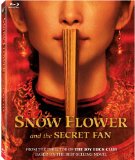| Reviews & Columns |
|
Reviews DVD TV on DVD Blu-ray 4K UHD International DVDs In Theaters Reviews by Studio Video Games Features Collector Series DVDs Easter Egg Database Interviews DVD Talk Radio Feature Articles Columns Anime Talk DVD Savant Horror DVDs The M.O.D. Squad Art House HD Talk Silent DVD
|
DVD Talk Forum |
|
|
| Resources |
|
DVD Price Search Customer Service #'s RCE Info Links |
|
Columns
|
|
|
Snow Flower and the Secret Fan
Fox // PG-13 // November 1, 2011
List Price: $39.99 [Buy now and save at Amazon]
The Film:
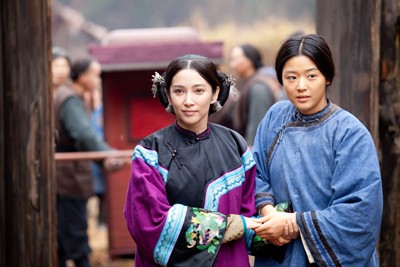 Several appealing themes and historical allures adorn Snow Flower and the Secret Fan: the camaraderie that forms amongst women, the practice of legally acknowledging that bond in 1800s China, and the use of a retracting hand fan as a means of secret communication between them. Most of these trace back the source material, Lisa See's heartrending novel that explores the pains of the era and the limited choices women were presented with, all handsomely dressed by capable photography that captures gorgeous locales and detailed garment work. But for everything that it gets right on the surface, Wayne Wang's direction takes it two steps back, resulting in a poorly-paced, tiresome, and often gratingly-acted period drama that's quite a lengthy distance behind the director's work on The Joy Luck Club.
Several appealing themes and historical allures adorn Snow Flower and the Secret Fan: the camaraderie that forms amongst women, the practice of legally acknowledging that bond in 1800s China, and the use of a retracting hand fan as a means of secret communication between them. Most of these trace back the source material, Lisa See's heartrending novel that explores the pains of the era and the limited choices women were presented with, all handsomely dressed by capable photography that captures gorgeous locales and detailed garment work. But for everything that it gets right on the surface, Wayne Wang's direction takes it two steps back, resulting in a poorly-paced, tiresome, and often gratingly-acted period drama that's quite a lengthy distance behind the director's work on The Joy Luck Club.
Fans of the book will be left confused by the alterations found. The bulk of it still takes place in 19th century China, where two young girls -- Snow Flower (Gianna Jun, Blood the Last Vampire), who comes from a wealthy family, and Lily (Li Bingbing, The Forbidden Kingdom), who comes from poverty -- are sworn to one another as friends under the practice of laotong, a bond considered stronger than marriage due to the "willingness" of it. Since they're of similar age, the dissimilar pair experiences the same issues that girls of the era would endure, especially that of foot binding, the painful bending and "beautifying" of feet. We follow them through their marriages, navigated by their appearance instead of class, and see how they secretly communicate through Nüshu script (a secret women's language) written on a folding silk fan when one of their families doesn't approve of their bond.
Then, there's another side of Snow Flower and the Secret Fan that takes place in the modern era, which is where the head-scratching begins. Teenage descendants of Snow Flower and Lily -- Sophia and Nina respectively, played by the same actresses -- also undergo the legally-binding laotong ceremony as a way of keeping history alive, yet Nina's family doesn't approve of Sophie, which keeps them separated. The actual here-and-now of the story finds Nina, now a well-to-do businesswoman, flying from New York (where she works) to Shanghai after an accident puts loose-cannon Sophie in the hospital, leading Nina to discover the path that her friend's life has taken in her absence. Through some sleuthing, she discovers where her laotong partner has been living and writing, why she's been venturing to a men's bathhouse, and how she got tangled up with an Australian bar-owner (Hugh Jackman).
While I can appreciate the intent behind the intersecting story threads -- the importance of the bond between women has traversed and withstood time, no matter the challenges that a certain era brings -- shoehorning the two periods into one film leaves little breathing room for focused drama within each, giving the narrative a heavy, dreary consistency due to its involvedness. There's a lot of story jumping going on in Snow Flower and the Secret Fan, and none of it is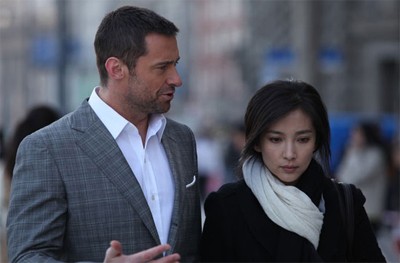 terribly satisfying to behold; watching the visual exploration of culture differences and parallels between the 1800s Chinese wives and their modern-era descendants offered a few sporadic moments of interest, but it's only on a purely cursory level. It's obvious that an earnest tale of strife and rigidity exists in the historical half of the adaptation, and that it has something profound to say, but it's not articulated here.
terribly satisfying to behold; watching the visual exploration of culture differences and parallels between the 1800s Chinese wives and their modern-era descendants offered a few sporadic moments of interest, but it's only on a purely cursory level. It's obvious that an earnest tale of strife and rigidity exists in the historical half of the adaptation, and that it has something profound to say, but it's not articulated here.
While Wayne Wang dresses Snow Flower and the Secret Fan with lavish colors, rustic scenery, and opulent low-key costume work, which intrigues the senses, he neglects to find dramatic steadiness or a robust thematic purpose behind his pretty but bloated period work. He shows a greater interest in allowing despondent facial close-ups and visual flair to force-feed tenderness instead of a true sense of empathetic draw, no matter which time period we're talking about, and it's not helped by the performances that either overextend or rigidly force the story's intimate and delicate moments. That's a big problem considering the personal nature of the story, and once Wang attempts to tie everything together into an evocative history-meets-modernity bow at the end, there's not enough valid emotional impetus to reinforce what should be a heartfelt and captivating cap to this arduous journey.
Oh well. At least you get to see Hugh Jackman sing in Mandarin.
The Blu-ray:
Video and Audio:
Poor critical reception proves once again not to deter Fox Home Entertainment from demonstrating their refined prowess in the high-definition arena for their day-and-date releases, especially with an opportunity like Snow Flower and the Secret Fan's quaintly stunning cinematography. The 2.35:1-framed merging of modern-era urban shots through Shanghai and historical Chinese locations offers one of the year's more impressive digital renderings, mostly because it has a great number of opportunities to flaunt its proficiency: the minutiae in wood etchings, the segments of ornate window guards, the subtle weaves of colorful fabric and the fluctuating stains of wood. Occasionally, there's a smoothness about the image that renders it a shade soft, and a few instances of compression that cramp facial details - not off-putting, but mildly noticeable. That's only with some nit-picking, because the crispness at-work here is consistently staggering.
The DTS-HD Master Audio track falls behind while trying to maintain pace with the quality of the visual treatment, but the delicate nature of the design services its HD clarity well enough. Minor sound effects are the victors of the day, such as the slight clanking of beads draping from an old Chinese veil and the pitter-patter of feet among the rustic Chinese locations. The music also provides a pivotal source of emotion in the film's tone, try too hard as it may, to which the sound design supports both modern thumps in nightclubs and the classic twang of the zither and other Asian scoring elements. You'll get to hear the mix of English and Chinese languages quite clearly and aware of the surroundings, marrying with Fox's visual transfer just fine. Subtitles are available in concise English text, which appear just underneath the image.
Special Features:
There's only one special feature that accompanies this release, but it's a successful one that does exactly what it should: elucidates the film's context and conceptualization. The Sworn Sisterhood of the Secret Fan (29:02, HD) first focuses on interview time with Lisa See, revealing how the genesis of her novel occurred while she reflected on her trip to China, where she set out to learn more about the secret women's language. Then, it centers on a chat with director Wayne Wang that reveals the reasoning behind adding the modern-era components to Lisa See's story, and why Wang only became interested in doing the project after those changes were made. Needless to say, it reveals a lot about the content from thereon out, and seeing the filmmakers' enthusiasm over both bringing the book to life and the history -- especially over the foot-binding -- does enrich one's appreciation for the historical portions of the movie.
A Theatrical Trailer also accompanies this release.
Final Thoughts:
There are positive themes that Snow Flower and the Secret Fan circles, from the bond between women to the acknowledgment and preservation of history, but they're lost among the sluggish pacing, discomfited performances, and awkwardly blunt dual-sided storytelling that Wayne Wang's directorial hand shapes. It can be visually beautiful and some tender moments do arise, but as a whole it's simply not as effective nor as dramaturgically authentic as a story like this needs to be. At least Fox Home Entertainment allows its positive aesthetic notes to shine on Blu-ray, though it'll make you wonder if the crisp, alluring HD clarity might be somewhat hypnotizing among the languid temper. Skip It.
Thomas Spurlin, Staff Reviewer -- DVDTalk Reviews | Personal Blog/Site
 Several appealing themes and historical allures adorn Snow Flower and the Secret Fan: the camaraderie that forms amongst women, the practice of legally acknowledging that bond in 1800s China, and the use of a retracting hand fan as a means of secret communication between them. Most of these trace back the source material, Lisa See's heartrending novel that explores the pains of the era and the limited choices women were presented with, all handsomely dressed by capable photography that captures gorgeous locales and detailed garment work. But for everything that it gets right on the surface, Wayne Wang's direction takes it two steps back, resulting in a poorly-paced, tiresome, and often gratingly-acted period drama that's quite a lengthy distance behind the director's work on The Joy Luck Club.
Several appealing themes and historical allures adorn Snow Flower and the Secret Fan: the camaraderie that forms amongst women, the practice of legally acknowledging that bond in 1800s China, and the use of a retracting hand fan as a means of secret communication between them. Most of these trace back the source material, Lisa See's heartrending novel that explores the pains of the era and the limited choices women were presented with, all handsomely dressed by capable photography that captures gorgeous locales and detailed garment work. But for everything that it gets right on the surface, Wayne Wang's direction takes it two steps back, resulting in a poorly-paced, tiresome, and often gratingly-acted period drama that's quite a lengthy distance behind the director's work on The Joy Luck Club. Fans of the book will be left confused by the alterations found. The bulk of it still takes place in 19th century China, where two young girls -- Snow Flower (Gianna Jun, Blood the Last Vampire), who comes from a wealthy family, and Lily (Li Bingbing, The Forbidden Kingdom), who comes from poverty -- are sworn to one another as friends under the practice of laotong, a bond considered stronger than marriage due to the "willingness" of it. Since they're of similar age, the dissimilar pair experiences the same issues that girls of the era would endure, especially that of foot binding, the painful bending and "beautifying" of feet. We follow them through their marriages, navigated by their appearance instead of class, and see how they secretly communicate through Nüshu script (a secret women's language) written on a folding silk fan when one of their families doesn't approve of their bond.
Then, there's another side of Snow Flower and the Secret Fan that takes place in the modern era, which is where the head-scratching begins. Teenage descendants of Snow Flower and Lily -- Sophia and Nina respectively, played by the same actresses -- also undergo the legally-binding laotong ceremony as a way of keeping history alive, yet Nina's family doesn't approve of Sophie, which keeps them separated. The actual here-and-now of the story finds Nina, now a well-to-do businesswoman, flying from New York (where she works) to Shanghai after an accident puts loose-cannon Sophie in the hospital, leading Nina to discover the path that her friend's life has taken in her absence. Through some sleuthing, she discovers where her laotong partner has been living and writing, why she's been venturing to a men's bathhouse, and how she got tangled up with an Australian bar-owner (Hugh Jackman).
While I can appreciate the intent behind the intersecting story threads -- the importance of the bond between women has traversed and withstood time, no matter the challenges that a certain era brings -- shoehorning the two periods into one film leaves little breathing room for focused drama within each, giving the narrative a heavy, dreary consistency due to its involvedness. There's a lot of story jumping going on in Snow Flower and the Secret Fan, and none of it is
 terribly satisfying to behold; watching the visual exploration of culture differences and parallels between the 1800s Chinese wives and their modern-era descendants offered a few sporadic moments of interest, but it's only on a purely cursory level. It's obvious that an earnest tale of strife and rigidity exists in the historical half of the adaptation, and that it has something profound to say, but it's not articulated here.
terribly satisfying to behold; watching the visual exploration of culture differences and parallels between the 1800s Chinese wives and their modern-era descendants offered a few sporadic moments of interest, but it's only on a purely cursory level. It's obvious that an earnest tale of strife and rigidity exists in the historical half of the adaptation, and that it has something profound to say, but it's not articulated here. While Wayne Wang dresses Snow Flower and the Secret Fan with lavish colors, rustic scenery, and opulent low-key costume work, which intrigues the senses, he neglects to find dramatic steadiness or a robust thematic purpose behind his pretty but bloated period work. He shows a greater interest in allowing despondent facial close-ups and visual flair to force-feed tenderness instead of a true sense of empathetic draw, no matter which time period we're talking about, and it's not helped by the performances that either overextend or rigidly force the story's intimate and delicate moments. That's a big problem considering the personal nature of the story, and once Wang attempts to tie everything together into an evocative history-meets-modernity bow at the end, there's not enough valid emotional impetus to reinforce what should be a heartfelt and captivating cap to this arduous journey.
Oh well. At least you get to see Hugh Jackman sing in Mandarin.
The Blu-ray:
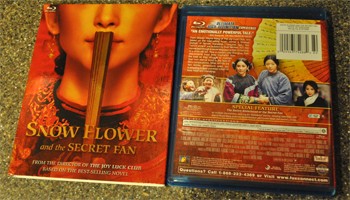 | 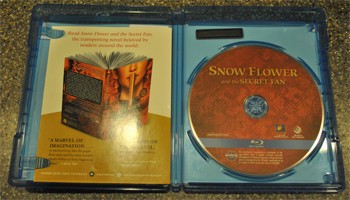 |
Video and Audio:
Poor critical reception proves once again not to deter Fox Home Entertainment from demonstrating their refined prowess in the high-definition arena for their day-and-date releases, especially with an opportunity like Snow Flower and the Secret Fan's quaintly stunning cinematography. The 2.35:1-framed merging of modern-era urban shots through Shanghai and historical Chinese locations offers one of the year's more impressive digital renderings, mostly because it has a great number of opportunities to flaunt its proficiency: the minutiae in wood etchings, the segments of ornate window guards, the subtle weaves of colorful fabric and the fluctuating stains of wood. Occasionally, there's a smoothness about the image that renders it a shade soft, and a few instances of compression that cramp facial details - not off-putting, but mildly noticeable. That's only with some nit-picking, because the crispness at-work here is consistently staggering.
The DTS-HD Master Audio track falls behind while trying to maintain pace with the quality of the visual treatment, but the delicate nature of the design services its HD clarity well enough. Minor sound effects are the victors of the day, such as the slight clanking of beads draping from an old Chinese veil and the pitter-patter of feet among the rustic Chinese locations. The music also provides a pivotal source of emotion in the film's tone, try too hard as it may, to which the sound design supports both modern thumps in nightclubs and the classic twang of the zither and other Asian scoring elements. You'll get to hear the mix of English and Chinese languages quite clearly and aware of the surroundings, marrying with Fox's visual transfer just fine. Subtitles are available in concise English text, which appear just underneath the image.
Special Features:
There's only one special feature that accompanies this release, but it's a successful one that does exactly what it should: elucidates the film's context and conceptualization. The Sworn Sisterhood of the Secret Fan (29:02, HD) first focuses on interview time with Lisa See, revealing how the genesis of her novel occurred while she reflected on her trip to China, where she set out to learn more about the secret women's language. Then, it centers on a chat with director Wayne Wang that reveals the reasoning behind adding the modern-era components to Lisa See's story, and why Wang only became interested in doing the project after those changes were made. Needless to say, it reveals a lot about the content from thereon out, and seeing the filmmakers' enthusiasm over both bringing the book to life and the history -- especially over the foot-binding -- does enrich one's appreciation for the historical portions of the movie.
A Theatrical Trailer also accompanies this release.
Final Thoughts:
There are positive themes that Snow Flower and the Secret Fan circles, from the bond between women to the acknowledgment and preservation of history, but they're lost among the sluggish pacing, discomfited performances, and awkwardly blunt dual-sided storytelling that Wayne Wang's directorial hand shapes. It can be visually beautiful and some tender moments do arise, but as a whole it's simply not as effective nor as dramaturgically authentic as a story like this needs to be. At least Fox Home Entertainment allows its positive aesthetic notes to shine on Blu-ray, though it'll make you wonder if the crisp, alluring HD clarity might be somewhat hypnotizing among the languid temper. Skip It.
|
| Popular Reviews |
| Sponsored Links |
|
|
| Sponsored Links |
|
|
| Release List | Reviews | Shop | Newsletter | Forum | DVD Giveaways | Blu-Ray | Advertise |
|
Copyright 2024 DVDTalk.com All Rights Reserved. Legal Info, Privacy Policy, Terms of Use,
Manage Preferences,
Your Privacy Choices | |||||||









